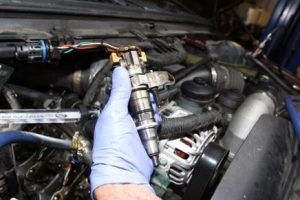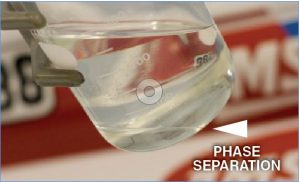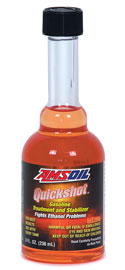Stiction… What Is It?
By now you’ve inevitably seen this term in turbo diesel enthusiast magazines. And if you own a Ford Powerstroke 6.0L diesel engine, then you likely have experienced it. Stiction… it’s a combination of two words. Static and Friction. What it really means is that there are two components touching each other and a specific force is required to get them to move relative to each other. Like your pen resting on your desk. It requires a certain amount of force to get your pen to slide across your desk.

So what have some savvy entrepreneurs done? They’ve come out with a product to improve on the situation. Unfortunately the problem is irreversible. You cannot replace wear with chemistry. So can it make it better for the short term? Yes. However it is truly short term and typically ends in injector replacement.
What is the magic chemistry in a small bottle that costs so much? It is a combination of detergent and friction modifier. The detergent goes in there and cleans up any deposits in the oil side of the injector to ensure the solenoid can fire as smooth as possible. The friction modifier goes in there and coats the two metallic components and provides a more slippery surface so that the increased clearance between the two of them results in less binding. Unfortunately this method doesn’t last that long and you have to either keep adding this special juice or just replace the injectors.
I’m sure if you are a 6.0L owner you are wondering what I could have done differently. Unfortunately, based on the design and pressures, I’m doubting whether there is a foolproof method to eliminate the problem. But there are ways to lessen the pain and improve on the longevity of those injectors.
First, you want to choose a high quality synthetic diesel engine oil, like AMSOIL, to ensure your injectors are staying clean and the oil is providing the best wear protection possible. Regular oil change intervals using a high quality oil filter is step two to this important process. And finally if you are trying to keep the oil side of the injector clean you better think about the nozzle of the injector and keeping that fuel flowing as Ford intended. Using a concentrated dose of diesel fuel additive, like AMSOIL Diesel Injector Clean, will help keep that injector flowing like new.
One more thing for northern climate enthusiasts to consider is engine oil viscosity. Since the HEUI injector uses engine oil to build fuel pressure it is very important to ensure the viscosity of the oil is suitable to promote development of proper fuel pressure. Take a look into your owner’s manual the next time you are in the garage. Your book will tell you that a 5W-40 or 15W-40 oil is recommended in most conditions, however if the temperature drops into the freezing range, Ford recommends you change to a 10W-30. No mystery why that is. The lower viscosity of the 10W-30 will flow more freely in cold temps and help develop fuel pressure much easier. Something to consider as you plan your oil changes throughout the year. Perhaps a viscosity change in the fall is the right answer for you. Whatever you choose to do, be confident that AMSOIL has a full line of high performance turbo diesel products for your truck. Take a closer look at http://www.amsoil.com/shop/by-equipment/diesel-motors/
Photo courtesy Diesel Power Magazine
Synthetic Warehouse note: The lower viscosity does so well for the Ford 6.0 that our #1 seller thanks for various diesel forums is our HDD 5W-30. Reduce the stress on your Ford 6.0 and call us or stop in for the 100% Synthetic Heavy Duty Diesel 5W-30 (Product Code HDD)



